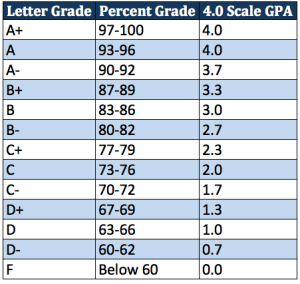Graduate school is a post-undergraduate school that awards master’s and doctoral (PhD) degrees. Grad school requires applicants to complete their undergraduate degree before attending.
(Technically, graduate school differs from business, medical, and law school, which are called professional schools. But, we’ll include business school in this post.)
Admissions to grad school is similar to undergrad admissions. Almost every grad school, and a growing number of business schools, require the Graduate Record Examination (GRE) standardized test. Most business schools require the Graduate Management Admission Test (GMAT).
Your test scores almost always have the highest effect on your acceptance or rejection to grad school. The second most important factor is your GPA, which helps to show your potential competence in the program. Strong recommendation letters and essays give the school a better picture of you to complete the evaluation and decision process.
Because grad school is expensive in itself—especially on top of potential undergraduate debt—you want to make sure that you’re going, or not going, for the right reason.
Reasons To Attend Grad School
All decisions should be made on an individual basis, but these are common reasons to attend grad school. If you’re reasoning aligns with one of these, feel confident in going to grad school.
1) You want quicker career advancement.
An employee with a MBA is in position for quicker promotion to mid-level management and leadership positions. Without an MBA, it might require more time and luck to receive major promotions. An advanced degree helps your mastery of a subject, and as mentioned before, society values mastery.
2) You desire to improve your employment options.
More industries seem to require a master’s degree for entry-level jobs than ever before. It’s almost necessary to have a master’s degree for quality work in government, social services, non-profits, teaching higher ed administration (check out something like an online masters in education), and other professions. And, people with graduate school degrees have lower unemployment rates than those with only a bachelor’s degree.
3) You desire greater financial rewards.
According to the U.S. Census Bureau, people ages 21 to 64 with an advanced degree earned an annual average salary of $55,242, compared to $42,877 for people with a bachelor’s degree. After you pay for the education, a grad school degree can pay for itself and then multiply over a lifetime of earnings.
4) Your employer encourages it and will pay for it.
If you’re in finance or consulting, sometimes your company will pay for your MBA with the mindset that it will help your work and future loyalty. If you have this option, then put thousands on the company’s tab and avoid the burden that comes with debt.
5) You want to change fields.
In the unfortunate event that you changed your mind and your undergrad major doesn’t get you a job in the field you want, a master’s degree can help you break into a new industry. I recommend that you try to spin your major into getting a job in that industry first, and see what happens. If it doesn’t work, then apply to grad school or
Reasons Not To Attend Grad School
Life is short, so don’t make the wrong decision and go to grad school if it doesn’t help you. These are five bad reasons to go to grad school.
1) You’re putting off work.
If you don’t want to join the working world, guess what? After grad school, you will have to face this fear anyway. Don’t let the fear of failure get in the way of your success.
2) You don’t know what else to do.
Go work or take a year off to travel and learn about yourself. Spending multiple years in grad school will leave you busy and it isn’t the best place to help you find your passion. It will most likely show you what you don’t want, and what you need to find is what you want.
3) Someone else wants you to go.
Investing that much time and money into grad school is crazy if it’s ultimately for your parents, family friend, significant other, or someone else. You cannot operate out of fear of disappointing them. Even if your parents pay for the education, the cost of time and missing out on other experiences is a detrimental to your future.
4) You want to be called doctor.
Even if this was a valid reason, which it’s not, unless you’re a medical doctor, half the time people won’t even recognize your PhD or call you doctor. Live your own life. Don’t live for what other people may think of you.
5) You can’t let go of your college experience.
There are happy hours, parties, and good times outside of college, too. Life after school is only as boring as you make it.
Final Thoughts
Going to grad school is a major decision, so think deeply about your reasons for attending. Depending on your situation, there are different ways to get a grad school degree. You could work and go to grad school part-time, or work part-time and go to grad school full-time.
If you do decide to go, use these 15 grad school application tips to excel in the admissions process and this guide to pay for it: How To Fund Graduate School.



